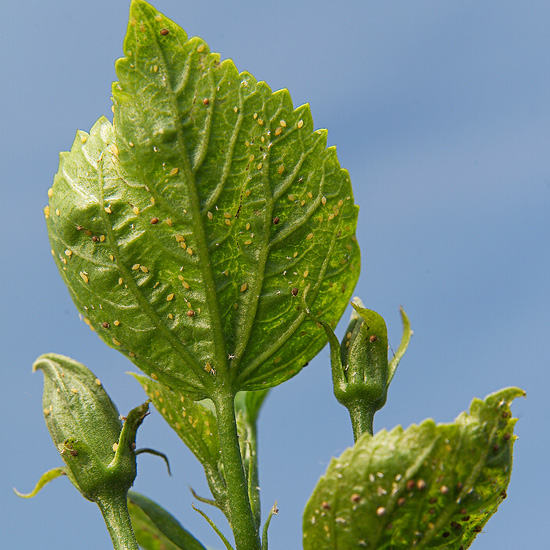






Aphids are sometimes called plant lice -- and if any of your plants fall under attack, you'll easily see why. These small insects reproduce with amazing speed. A small infestation of aphids can turn into a big problem in just a couple of days.
Aphids range in color from green to yellow, brown, red, or even black. All aphids suck sap from your plants, causing leaf curling or yellowing. Bigger infestations of aphids can distort or even kill new growth shoots. Aphids also excrete a sugary substance called honeydew.
Your plants may show a side effect of an aphid infestation: a black fungus called sooty mold. This after-effect of aphids grows on honeydew and blocks the amount of light that gets to your plant (but is otherwise harmless). Wash your plant leaves with water to get rid of the honeydew and sooty mold.
continue reading belowRow covers: In spring, protect young plants from aphids with floating row covers. These row covers keep the aphids out but allow air, light, and moisture to reach your plants. Remove the row covers when your seedlings grow too large or when the temperatures heat up in summer.
Spraying with water: The safest way to control aphids is to spray them off your plants with a stream of water from the garden hose every two or three days. Once aphids are knocked off a plant, they rarely climb back on.
Attract beneficial insects: Plant flowers, such as marigolds, calendula, sunflower, daisy, alyssum, or dill nearby to attract beneficial insects that attack and kill aphids. Ladybugs are especially fond of aphids.
Insecticidal soaps: Insecticidal soaps will also kill aphids but must be applied on a regular basis in heavy infestations because aphids reproduce so quickly. A single aphid can produce up to 80 baby aphids in a week.
Insecticides: A number of insecticides also effectively kill aphids. Be sure to follow the package directions carefully.
Note: Sometimes ants will eat the honeydew left by the aphids. While the ants don't harm plants, they can protect the aphids from beneficial insects. If you get rid of the aphid populations, the ants should go away.
Copyright © www.100flowers.win Botanic Garden All Rights Reserved